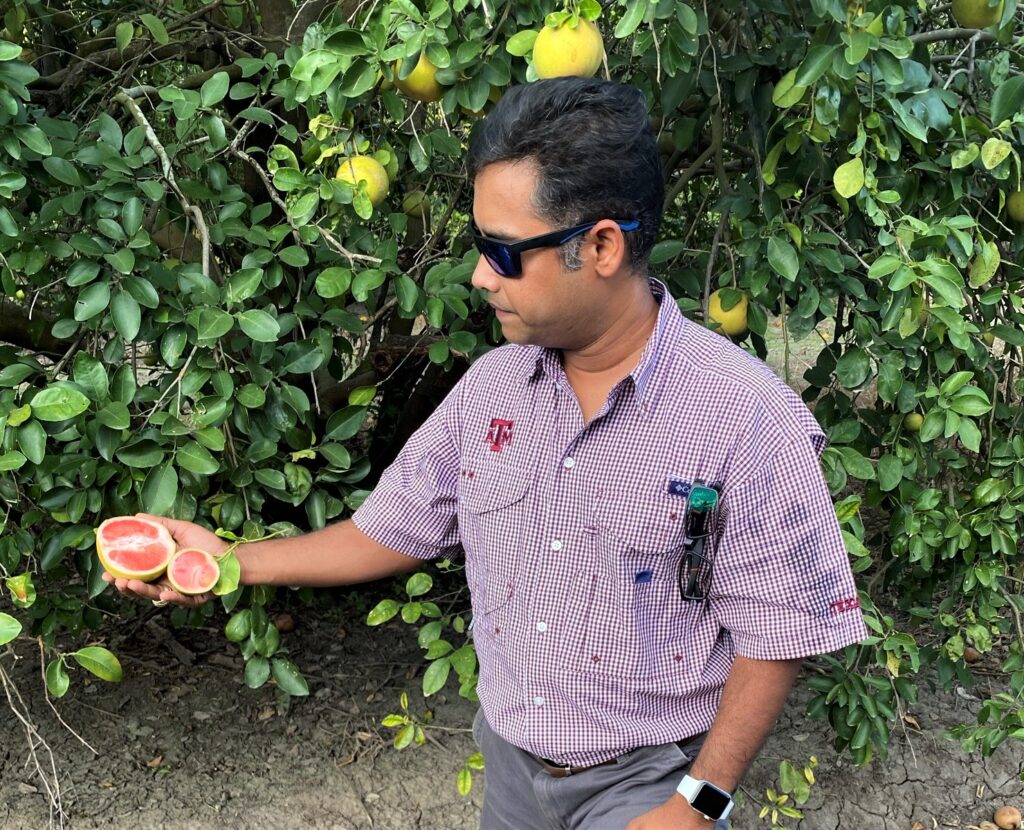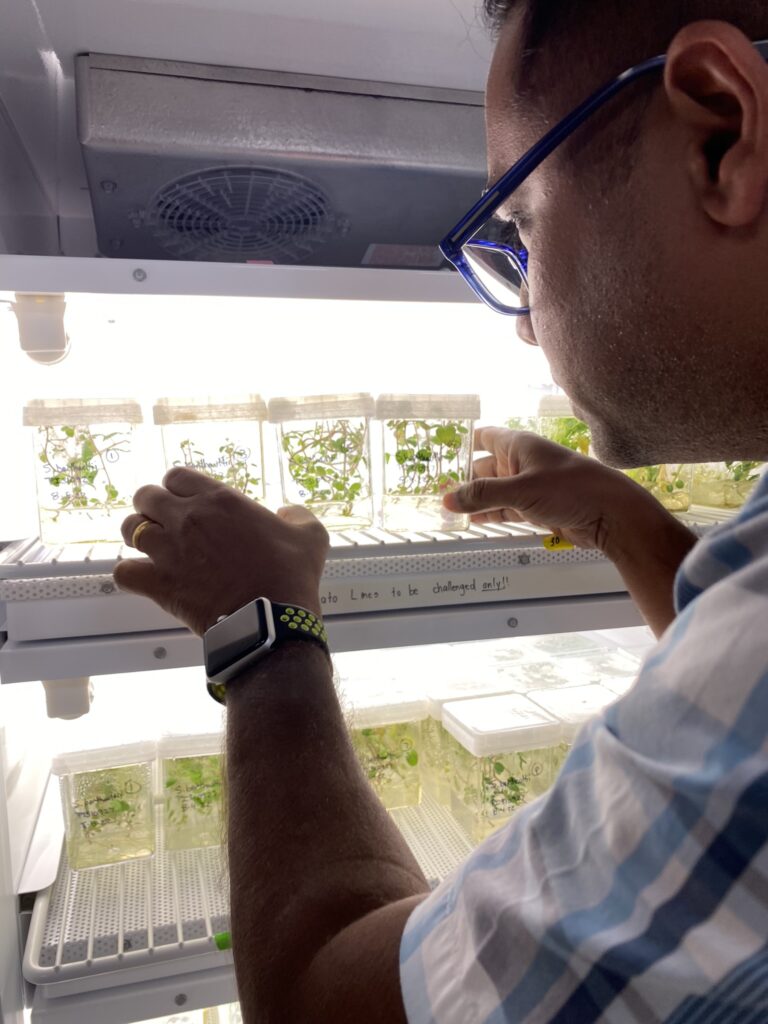Distinguished Texas A&M plant pathologist receives American Phytopathological Society Syngenta Award
Mandadi selected for research breakthrough to help combat citrus greening, related plant diseases
Kranthi Mandadi, Ph.D., has received the 2024 American Phytopathological Society, APS, Syngenta Award — a prestigious award given to select scientists working in areas of crop protection and plant pathology worldwide.

Mandadi, an associate professor in the Texas A&M Department of Plant Pathology and Microbiology at the Texas A&M AgriLife Research and Extension Center at Weslaco, was selected for the award primarily for his breakthrough research on fastidious, or unculturable, plant pathogens.
The award is provided and given by Syngenta Crop Protection to an APS member for outstanding recent contributions to plant pathology through teaching, research or extension.
“I am greatly honored to have been selected for this award and want to dedicate it to all my past and current lab members, colleagues, collaborators and industry partners whose contributions were invaluable to my research success,” Mandadi said. “I also want to thank Texas A&M AgriLife, the U.S. Department of Agriculture National Institute of Food and Agriculture and Foundation for Food and Agriculture Research programs for supporting and fostering innovative, high-risk/high-reward research through their funding and capacity support.”
Mandadi’s plant pathology expertise, efforts
Amir Ibrahim, Ph.D., associate director and chief scientific officer of Texas A&M AgriLife Research, said Mandadi spearheads a highly successful and impactful research program focusing on innovative crop improvement and protection technologies.
“Notably, Dr. Mandadi serves as the project director of a $7 million USDA-NIFA multistate, coordinated agricultural project and a designated center of excellence aimed at assessing new citrus greening therapies,” Ibrahim said. “This initiative entails collaborations among multiple universities, states, federal agencies and the citrus industry.”
Ibrahim said Mandadi’s award from the American Phytopathological Society serves as a “compelling testament to how Texas A&M AgriLife scientists lead through their exemplary work to create impacts that benefit its stakeholders, Texans and the world at large.”
Mandadi’s breakthrough research in plant pathology
Mandadi has pioneered inventive contributions to fundamental knowledge, tools and applied technologies for studying pathogens that devastate many agricultural production systems worldwide.

His breakthrough research was an innovative technology called the “microbial hairy root system,” which helped resolve the bottlenecks associated with culturing pathogens difficult to grow in labs. The patented technique uses infected plant tissues to make hairy roots that can serve as biological vessels for the complex pathogens, allowing scientists to grow and study them in the lab.
By leveraging this technology through multi-institutional, interdisciplinary collaborations, Mandadi has identified multiple immune-related genes, antimicrobial peptides, CRISPR targets and small molecule-based treatments to effectively kill the Candidatus Liberibacter bacterial species associated with citrus greening.
Also known as Huanglongbing disease, citrus greening is the most devastating disease of citrus and the greatest threat to the approximately $13 billion U.S. citrus industry.
The Candidatus Liberibacter bacterial species also causes diseases in potatoes, tomatoes, peppers and carrots.
Building a career in plant-virus research
Mandadi was born in India and earned his bachelor’s degree in agricultural sciences from ANGRAU University. He earned a master’s degree in plant and soil sciences from Texas A&M University-Kingsville and a doctoral degree in molecular and environmental plant sciences from Texas A&M University in Bryan-College Station.
As a postdoctoral researcher in plant virology at Texas A&M, Mandadi pioneered the use of Brachypodium, a grass common to Eurasia, Africa and Latin America, as a genetic model system for understanding plant-virus interactions. In 2015, he was hired as an assistant professor in plant pathology and microbiology at the Texas A&M AgriLife center in Weslaco. He was promoted to associate professor in 2020.
Mandadi has published more than 64 peer-reviewed manuscripts in high-impact scientific journals including The Plant Cell, Plant Biotechnology Journal and Nature Communications. His research has more than 2,500 citations and there have been more than 60 stories or news articles related to his findings and projects.
He is committed to the translation and commercialization of his discoveries through public-private partnerships with industry partners such as Bayer, Southern Gardens Citrus and U.S. Sugar as well as producer/stakeholder groups such as Texas Citrus Mutual, Citrus Research and Development Foundation and Texas International Produce Association.
In 2017, Mandadi was awarded the Foundation for Food and Agricultural Research New Innovator in Food and Agricultural Research award. He has also received the 2020 Texas A&M AgriLife Research Directors Superior Grantsmanship Award for excellence in grantsmanship and the 2022 Texas A&M AgriLife Research Scientist of the Year award.
He has served as vice president, president and immediate past president of the Texas Plant Protection Association, as well as on the organizing committee of the 2nd Congress of the International Society for Citrus Huanglongbing and Phloem-Colonizing Bacterial Pathosystems.
Mandadi also served two terms as a nominated member of the American Society of Plant Biologists on their membership and international committee. Most recently, he chaired the Society’s local organizing committee to host the 2023 annual meeting of the APS Caribbean Division at South Padre Island.


